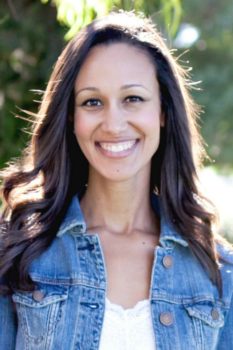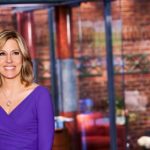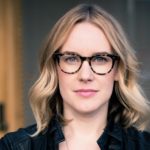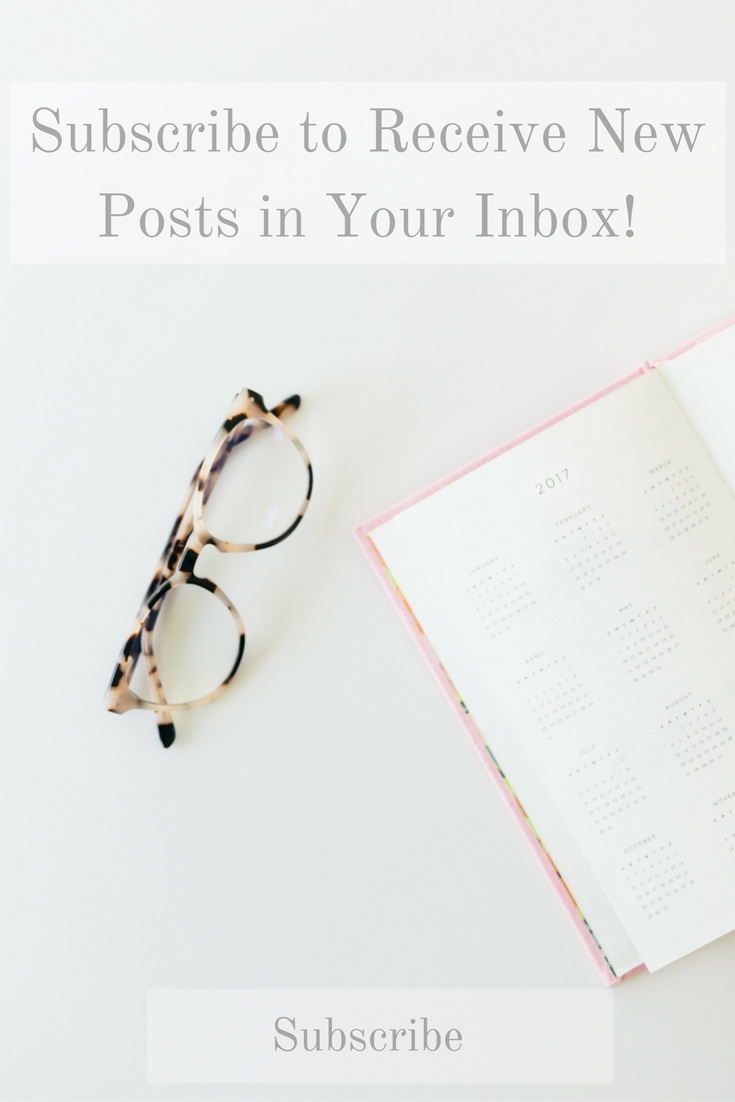One of my favorite things about being an editorial contributor at Career Contessa is working closely with Jenna Arak. Jenna works on articles with me and helps me make them stronger. When Jenna isn’t adding em dashes and great content ideas at Career Contessa, she is writing and managing her own business. Jenna helps female founders tell their businesses’ stories. When you read her career advice and story today, you’ll understand why she’s more than fit to do just that!

You are the founder of Jenna Arak Modern-Day Storyteller. What was the inspiration behind your business? Were you always interested in writing and helping people tell their stories?
I have always loved writing and telling stories. When I was around two years old—before I could actually write myself—I used to dictate stories to my mom, who would write them down, then hole punch the papers and tie them together with yarn. So, what I’m saying is I was first “published” nearly 30 years ago. My business, which is still relatively new, is my attempt at doing work that I love and work that is valuable to other people. Everyone has an important story, though it’s often hard to see the value in our own experience—so I get to help people see their value and tell their story. And I get to write, too! It’s incredibly fulfilling.
Have you always been passionate about writing and storytelling? When did you realize that you could turn it into your career?
I don’t think I ever “realized” that I could make this a career, so much as I hoped I could. In fact, for a long time, I didn’t think I could make a living writing—not without being a “starving artist,” anyway. For a few years, I would write and submit my personal essays or articles while I worked full-time. It wasn’t until very recently that I began to see the connection between my background (in PR and marketing) and my passion for writing, and I’ve been working to make that my new career ever since.
How would you describe your business and why it is important?
This is tough because I feel that I’m in a bit of a transition at the moment, but I’ll say this: My overarching goal in business and in life is to tell stories (whether they’re mine or someone else’s) that have universal appeal and universal value. In exploring and mining my own experience, I want to help people learn and work through their own. And I want to help people recognize the value in their experience and effectively communicate it to the audience that needs to hear it—whether that be a potential employer or a customer or their in-laws. And I think that’s important—I think it’s important to share our own stories in service of others because that’s how we all grow. I know that’s how I’ve best learned; through other people’s experiences.
What advice do you have for people who want to start their own business?
Oh goodness, SO MUCH. Since there’s a lot of (very good) advice on the basics of starting a business out there, I’ll share a few things I wish I’d known: I wish I had known that no one is thinking of me nearly as much as I think they are. They’re just not. Everyone has their own shit to worry about and I am just a small blip on their Twitter timeline. Also? If they are thinking of me—and they don’t like me or find me obnoxious, that’s okay. They’ll probably never buy my services or be my friend and that’s for the best because we likely wouldn’t have gotten along very well anyway. I wish I had known that I didn’t need to say “yes” to every job. If a potential client seems like they’re going to be a pain in the ass, they are. (And they’re not worth the paycheck.) In that same vein, I wish I had known that the money would always come. I would have to actively seek it out sometimes, but having an abundance mindset really changed my life and my business. Finally, I wish I had known that the things I think are basic or common knowledge actually aren’t. I’ve learned quite a bit in my 30 years on earth and I have things to share that other people don’t know—and would actually love to learn!
You’ve been featured in incredible publications like Salon and Forbes! As another freelance writer, I’d love to know any advice you have on pitching stories and building a freelance writing portfolio.
Absolutely. I would say, first and foremost: Do your homework. Research the publication in the same way that you’d research a potential employer before a job interview. Don’t write about something if they’ve already covered it. Structure your article to match their style and voice. If they have submission guidelines, read them and follow them! This stuff seems so basic, but I’m amazed by how many people don’t do these simple things—and I see it even more now that I’m working as an editor.
Also, make your editor’s life easier whenever possible. If they’re editing for anything, it should be the content of your story—they can help you with consistency, flow, pieces that may be missing. Your work—and your pitch!—should be grammatically on point before it hits their email inbox.
And even if you’ve built a relationship with the editor—which you should by continuing to send them pitches or information they might find interesting or helpful—continue to be professional when it comes to pitching/submitting your work. I’ve had writers send me emails with no content in the body (just an attachment) and readers who’ve pitched themselves by saying “they want to expand their portfolio” (I’m sure you do—what exactly is in it for me/this site?), and it’s incredibly unprofessional. No matter how good of a writer they are, it leaves a bad taste in my mouth and makes me think they’re a bigger hassle to work with than they’re worth. Don’t be that person.
On the contrary, be polite, be responsive, be professional. It’s not rocket science, but so few people actually do it, that the writers who do really stand out.
What is a typical day like for you?
Cliche (but true) answer: I don’t have a typical day, ha. I work in-person with the Career Contessa team two days a week, and I work from home the rest of the time. Regardless, I start every day with a smoothie and two cups of coffee—I can’t do much before that. Then, I’ll jump into my inbox, answer any pressing emails, and get to work. These days, Career Contessa work (which includes meetings, pitching stories, editing articles, back-and-forth with our photo director and graphic designer, etc.) comes first and I tackle my additional copywriting/personal projects in the afternoon or after dinner.
My eventual goal is to begin waking up even earlier to do my own writing (not my clients’, not Career Contessa’s) before I even see an email, but I’m not quite there yet.
What are some of the best things, and on the flip side the most challenging things, about starting your own business?
The best things are doing work I love with people I enjoy and feel proud to support. I’m also a big, big fan of location- and schedule-independence. I actually really like to work from home—I get a lot more done without the distraction of other people—and I enjoy making my own schedule. Some days I work better from 6-10 am and then again after my evening spin class, so I like being able to dictate when I work.
The biggest challenge is not knowing how much money I’ll make in a given month—even if I know exactly what projects I’ll have, I won’t see the pay for some for months (either because of the length of the project or because—as happens more often—a client doesn’t pay on time). I also have those days where I’m not feeling particularly confident and I let anxiety take over, and I wish I could just go into an office and have someone tell me what to do and deposit money into my bank account twice a month. I do miss the security of full-time work some days. But not often. And the positives of this work far (FAR) outweigh the positives of working my ass off to build someone else’s business.
We met because you are the editor at Career Contessa. What are your responsibilities at Career Contessa and what drew you to the position?
I manage all things related to the blog at Career Contessa’s Conversations section of the site. I manage our editorial calendar, our contributors, and our content, so on any given day, I am editing articles, corresponding with writers, pitching guest writers, and scheduling/publishing content, amongst other things. I also work with our founder, Lauren, as well as our marketing director, photo director, and graphic designer on a daily basis. Basically, anything that goes up on the blog is my responsibility and has started and ended with me.
I was drawn to the position because I loved the site and I was passionate about what Lauren and the team had built: a site that offered not just career inspiration (through the Contessa profiles), but actionable advice (through the blog). I could see that the site was growing fast, and I wanted to be a part of taking the content to the next level. Also, even though my position was freelance, it allowed me the opportunity to really dig deep on one project and supplement that income with only the other projects I felt passionate about doing—in other words, I’m no longer taking on small projects just for the money.
How do you think your career path led you to what you do now?
Well, my background in PR and marketing has been instrumental, not only in my work as a copywriter, but in my own marketing of myself, my business, and my services. My career experience also taught me what I don’t want: never say never, but I’m fairly certain I will never go back to a career in public relations. I’m really, really thankful for all of my career opportunities. I never truly had a “bad” job, just jobs that weren’t the right fit for me—and every single one of them taught me skills and life lessons that I use every day as I manage my own business and help build the Career Contessa platform.
What is one thing that you wish you had known when you were starting out your career?
I wish I had known that I didn’t need to take the first job that was offered to me. I also wish I had had more internships (and thus, explored more career paths)—this is advice I had heard, but just didn’t follow.
Where do you see yourself in the next five years?
I think I’ll still be doing what I’m doing now—hopefully, on an even larger scale! I have always loved writing and it’s only been very recently that I felt comfortable sharing my writing with the world. I’ve had a slow, but steady start and I think in five years I will have been published in even more of the outlets I admire. I’d also love to write a book of personal essays. And I think (hope) I’ll be a mom, too!
How would you define your professional style? What are a few staples?
Honestly, my professional style is pretty casual. I would say that’s because I’ve worked from home for the past eight months, but really I’ve always had a very casual professional style because I’ve always worked in very relaxed office environments. My go-to “dress up” outfit—in work and in life—is my American Eagle Outfitter jeans, a white or black v-neck t-shirt from Target, a black blazer, and a pair of brown boots. I can pretty much guarantee that I’ll never be a fashion blogger!
What is on your desk right now?
My desktop Apple computer and my laptop Apple computer (on a mStand), my Emily Ley Simplified Planner (because I’m an odd duck, who needs her life planned out both digitally and on paper), my iPhone, a flower vase—usually filled with tulips, the AP Stylebook, a “Get Shit Done” paperweight (and reminder) I was gifted from a dear friend, a yellow Page Up paper holder, a photo of my brother and me from my wedding, and a smattering of notepads, notebooks, and books on writing.
Where do you turn for inspiration?
I read for inspiration. If I’m unsure of what to blog about, for instance, I’ll start reading one of (the many!) books on my nightstand, or I’ll check out a few articles I’ve recently favorited on Twitter.
Who is your mentor?
I don’t know that I have a specific “mentor”, so much as I have a group of people whose opinions and advice I respect and trust. This includes, first and foremost, my mom and my husband, and then a very small group of friends and a former female boss.
What is the best advice you’ve ever received?
“Just start.”
What is a fun fact about you?
I have naturally curly hair—which I’m slowly learning to love again, after years (YEARS) of straightening it every other day.
What advice do you have for other young professional women?
You are smarter than you know and more capable than you feel. Remember that; then just start.
What is your favorite quote?
“Let me live, love, and say it well in good sentences.” – Sylvia Plath
Thank you, Jenna!

































Pingback: My Favorite Career Profile Quotes From 2015 - Elana Lyn
Pingback: My Favorite Career Profile Quotes From 2016